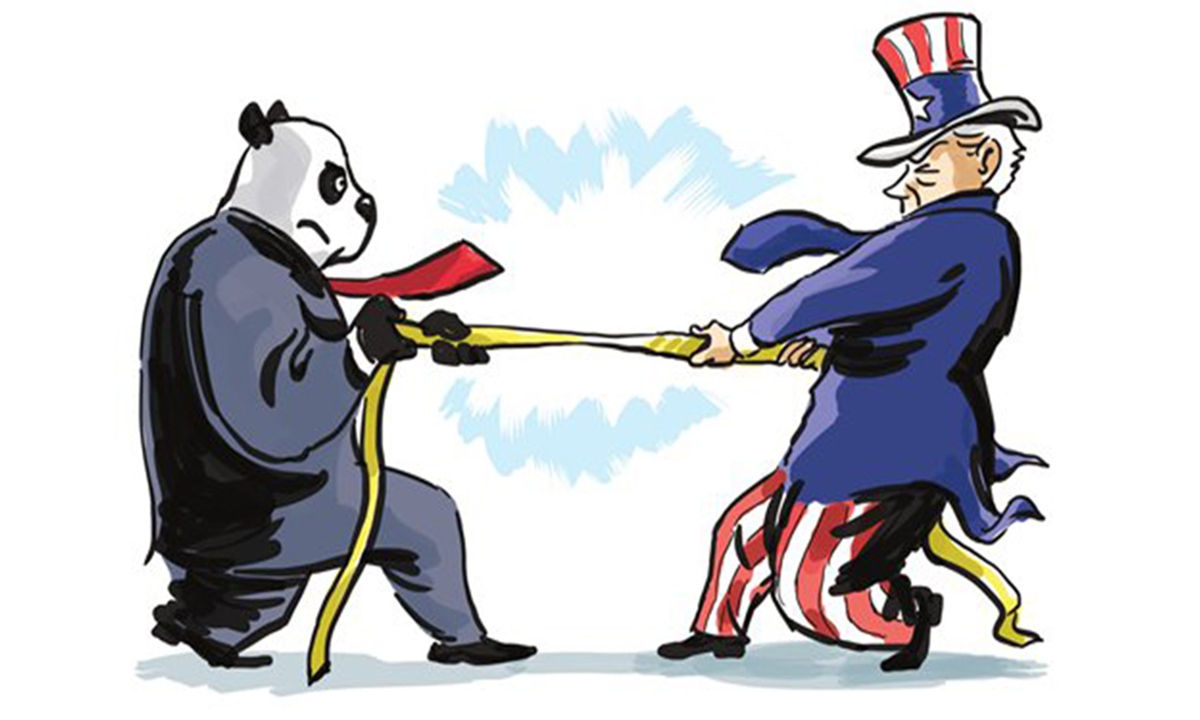China-US conflicts not about values but interests: Global Times editorial
Source: Global Times Published: 2020/12/13 20:17:06

Illustration: Liu Rui/GT
From the perspective of history, are the differences between diverse societies, countries and civilizations shrinking or expanding? We believe they are shrinking, as economic and cultural exchanges inevitably increase. Globalization has not only occurred in areas such as the economy and information, it has had comprehensive influences. Human societies are in a brand-new era where people are using the same technologies and living a similar life, while focusing on common topics.
Some Western leaders prefer the term "values" and define the frictions between Western countries and China as "value conflicts." They emphasize that the anti-China front they are striving to build up is a value-based alliance. Chinese people should not fall into the trap of such a narrative. China's values are not incompatible with Western society. Beijing has repeatedly underlined "common values of humanity," which are not so different from the West's universal values. The difference is that the phrase "universal values" is often used along with Western expansionist moves - it is not just a concept but reminds people of certain policies.
Meanwhile, the phrase "common values" is more neutral and objective. The difference between Chinese and Western value systems has been exaggerated. Values that the West cherishes - democracy, freedom, rule of law and equality - also take roots in core values of Chinese socialism, and they are what Chinese society pursues. The rule of law is especially promoted by the Chinese government and equality is one of the political ideals that most resonates among ordinary Chinese. The pursuit of justice and equity has been a vital reason for China's dynamic public opinion sphere in the past years.
Due to different political systems and development processes, the values of China and the West have acted differently in guiding their respective societies. But there it is largely inconsistent with the facts to describe the frictions between China and the West, especially between China and the US, as antagonism of two different value systems. This is a top-level misjudgment of the West-centric mentality. If spreads across the world, such a misjudgment will cause a series of overreactions - such as suspecting non-governmental exchanges as a gateway to infiltration.
Most of the differences between China and the West are demonstrated at an ideological level. The known use of "ideology" was later than "value." The definition of "ideology" also varies. Generally speaking, ideology is a kind of superstructure to guarantee a country's interests. In addition to being influenced by "values," it is branded with the mark of political systems.
As long as there are exchanges between different societies, groups and people, contact between value systems will take place. The impact of ideology is usually subject to the scope of national power. Without the support of power, the impact of ideology will be greatly reduced. Therefore, ideological expansion often relies on the use of military, economic and cultural tools. Over the past few decades, the West has undoubtedly been the main force to promote ideological expansion. In contrast, expansion of non-Western ideologies is hard to realize.
Compared with the West, China is in a relatively weak position in terms of military, economic and cultural influence. In short, the value differences between China and the West have been exaggerated. With the Chinese people's livelihood getting closer to that of their Western counterparts, the value differences between the two sides are no longer as large as a great gulf. From the perspective of ideological competition, China is clearly on the defensive. In other words, we only just have managed to resist ideological attacks from the West, but we are far from having the ability to launch counterattacks on the West. Chinese people even lack intention in this regard.
From our point of view, the competition between China and the US is mainly about interests. The real intention of the US launching an ideological offensive against China is to safeguard its hegemonic status. It is an absurd argument that the essences of the two political systems are two different ways of social governance that cannot coexist on Earth. A look at China-Europe relations can clearly illustrate this. Although there are frictions between China and Europe, cooperation constitutes the fundamentals of bilateral ties.
Washington has continued to intensify China-US ideological conflicts and distorted them as a confrontation between Chinese and Western values. The Chinese side should not fall into its trap. We must continue to promote common values of humanity and deal with China-US and China-West ideological frictions in a calm manner. We should not actively escalate them, but seek to define their impacts based on facts, making it clear that ideological frictions are more about conflicts of interests rather than the so-called conflicts of values. Finally, we should manage to control them in face of the international community.
Posted in: EDITORIAL